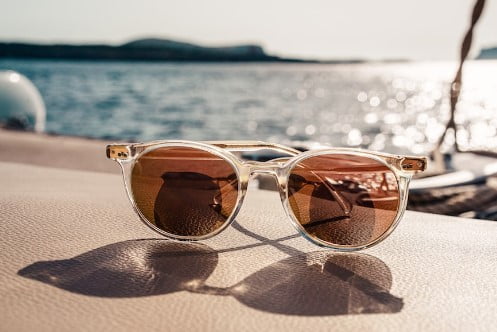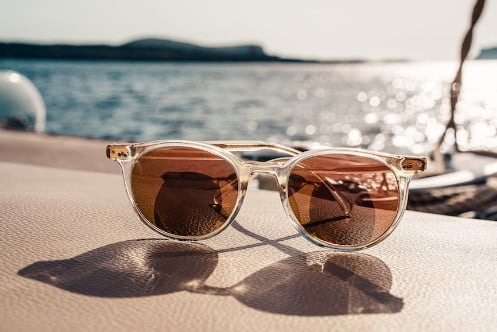
A pair of shades on your face does more than look good. It also protects your eyes from harmful ultraviolet (UV) light. That’s why it’s important to wear sunglasses throughout the year, whether it’s hot, cool, sunny, or cloudy outside. At Northeastern Eye Institute, we understand the importance of eye protection to help prevent optical damage. Let’s examine how you can choose the best sunwear for your needs.
Why Wear Sunglasses?

Over time, exposure to UV light can damage the lenses, corneas, retinas, and lids of the eyes. By regularly wearing sunglasses, you can prevent the onset of optical conditions such as:
Macular Degeneration
The macula is an interior area of the eyeball located at the center rear of the retina. Though small — measuring just 5 mm across — it plays an outsized role in central vision as well as the perception of colors and fine details. Long-term exposure to UV light can degenerate the macula, resulting in the loss of visual acuity.
Cataracts
Cataracts are a clouding of the optical lens of the eye, the risk of which increases with prolonged UV light exposure. Having cloudy lenses is much like looking through fogged-up glass. Unable to see clearly, you’re likely to struggle with ordinary activities like reading, watching television, and driving.
Pterygium
Pterygium refers to a growth that forms on the conjunctiva — the clear protective membrane over the whites of the eye — and extends into the cornea. Its primary cause is exposure to sunlight, particularly that which reflects off of snow or water.
Photokeratitis
Photokeratitis is like a sunburn, except that it affects the cornea. Exposure to harsh UV light is one of the primary causes of this condition, which can cause pain, photosensitivity, redness, and swelling. It’s typically temporary but can result in permanent damage if left untreated.
Eyelid Skin Cancers
All areas of the skin are susceptible to UV-related cancers, and the eyelids are no different. Without taking preventive measures, you may be at risk for conditions such as squamous cell carcinoma and basal cell carcinoma. Wearing protective eyewear keeps both your eyes and the surrounding skin safe from the sun’s radiation.
How To Choose the Best Sunglasses for Eye Protection
Selecting the right sunglasses is about more than finding attractive frames. There are numerous factors to consider to make sure you’re getting the best protective value possible.
Focus your search on UV 400 glasses, which block 99%-100% of both UVA and UVB light. UVA light, which has a longer wavelength, is capable of passing through the cornea and reaching the lens, causing conditions like cataracts and macular degeneration. UVB light has a shorter wavelength and is principally responsible for sunburns and photokeratitis. Protection against both types of UV light can prevent such conditions from developing.
If you already suffer from macular degeneration or from a condition such as diabetic retinopathy, look for brown or amber-colored lenses. Compared to black shades, these colors provide better contrast, allowing you to see more clearly. Keep in mind that you still need a high UV rating, so skip the brown and amber if they aren’t rated UV 400.
For those who spend a large amount of time outdoors polarized sunglasses are worth considering. Polarization is a feature that reduces glare, which, in turn, offers enhanced protection against reflective light. This characteristic makes polarized lenses especially useful in areas with highly reflective surfaces, such as bodies of water, as well as for everyday activities like driving.
Already wear prescription eyewear? Glasses nowadays tend to offer some UV protection but not enough to offer reliable protection against the harshest light. Luckily, there are a couple of solutions available to you. The simplest is to get a pair of prescription sunglasses along with your regular glasses. You can wear the latter indoors but switch to the former when you go outside. Another option is to get one pair of glasses with photochromic lenses, which darken upon exposure to UV light — a convenient choice if you don’t want to bother with frequent swapping of your eyewear.
Finally, make sure you choose a style of sunglasses that you like. The more positively you feel about your shades, the more likely you are to wear them. If cost is a concern, look for a design that matches well with your wardrobe and general sense of style. That way, you can be sure that you look great while preserving your optical health.
Sunglasses for Children
If you have kids, keep their eyes protected, too. UV-related damage is cumulative, meaning that it builds up over time, so it’s never too early to take preventive measures. Also, UV sensitivity may be especially high for children’s eyes, making it all the more imperative to protect them.
At Northeastern Eye Institute, we have a dedicated team of eye doctors who specialize in pediatric eye care. We can help you educate your children on the importance of wearing protective eyewear and guide them as they select a pair of their own.
Tips for Maximum Eye Protection
To ensure that you get the most protective value out of your sunglasses, follow these tips:
- Wear them year-round: UV light is present on cool, cloudy days as much as it is on hot, sunny ones.
- Think bigger: Larger sunglasses, particularly wider ones, provide more coverage and, therefore, more protection.
- Think cheap: Pricier sunglasses aren’t necessarily more protective, and UV 400-protected glasses are often quite inexpensive.
- Double-check the protection: Take your sunglasses to an optical shop, eye doctor, or anyone else with a UV light meter to make sure that the UV rating on the label is accurate.
If you need further help choosing the best shades for eye protection, stop in to one of our 15 locations across Northeastern Pennsylvania to get an up-close look at our extensive inventory of optometrist-approved sunglasses. Since 1984, we at Northeastern Eye Institute have been among the leaders in eye care and vision correction. Our team of board-certified providers has the expertise to meet any of your ophthalmologic needs.
If you have any questions about our offerings beforehand, or you want to schedule your next eye exam, feel free to reach out to us. Email us at [email protected] or fill out the contact form on our home page with your name, contact information, and message, and we’ll get in touch with you shortly. Alternatively, give us a call at 570-342-3145 to speak directly with an associate. We look forward to seeing you — and to you seeing well.